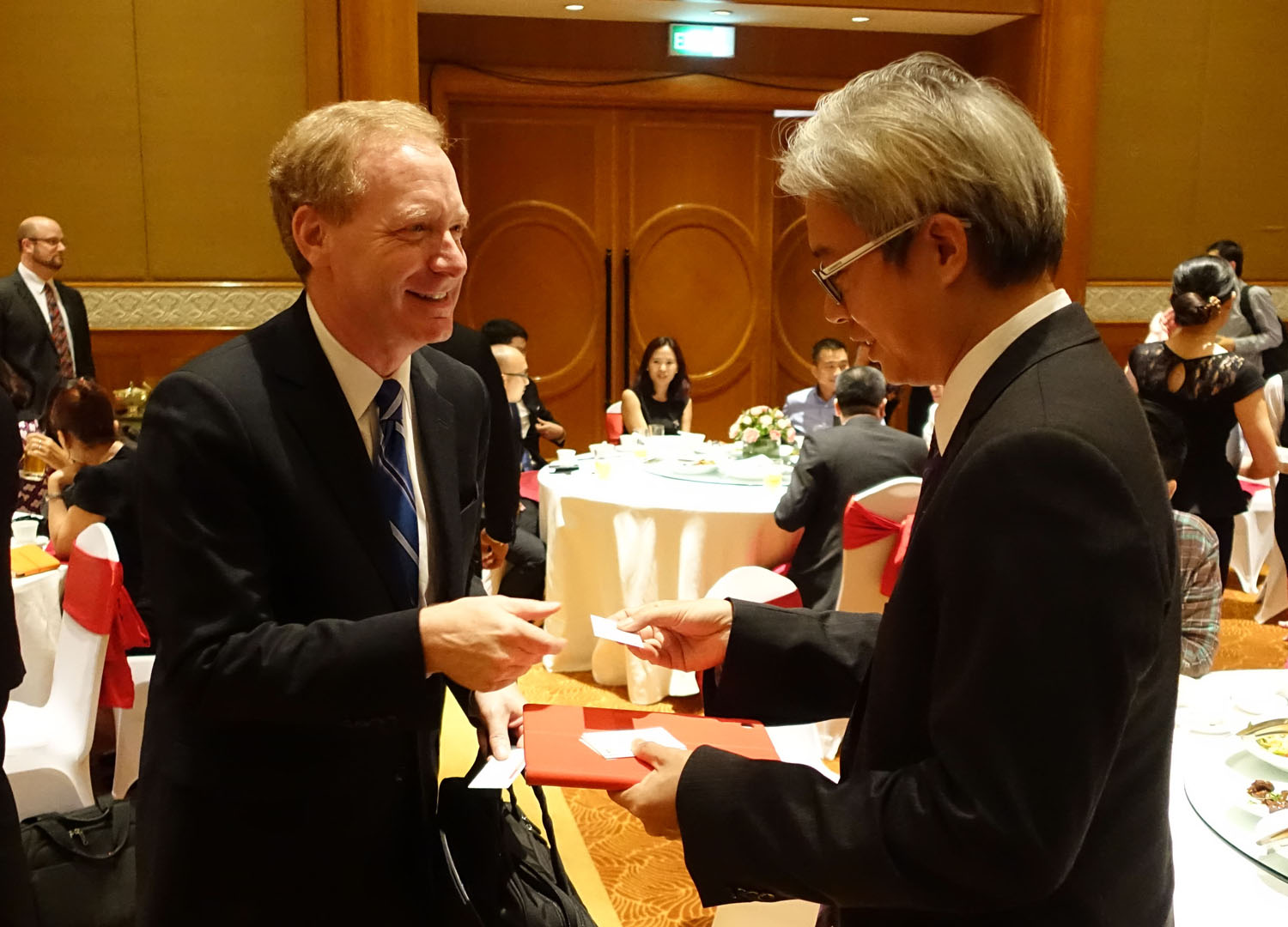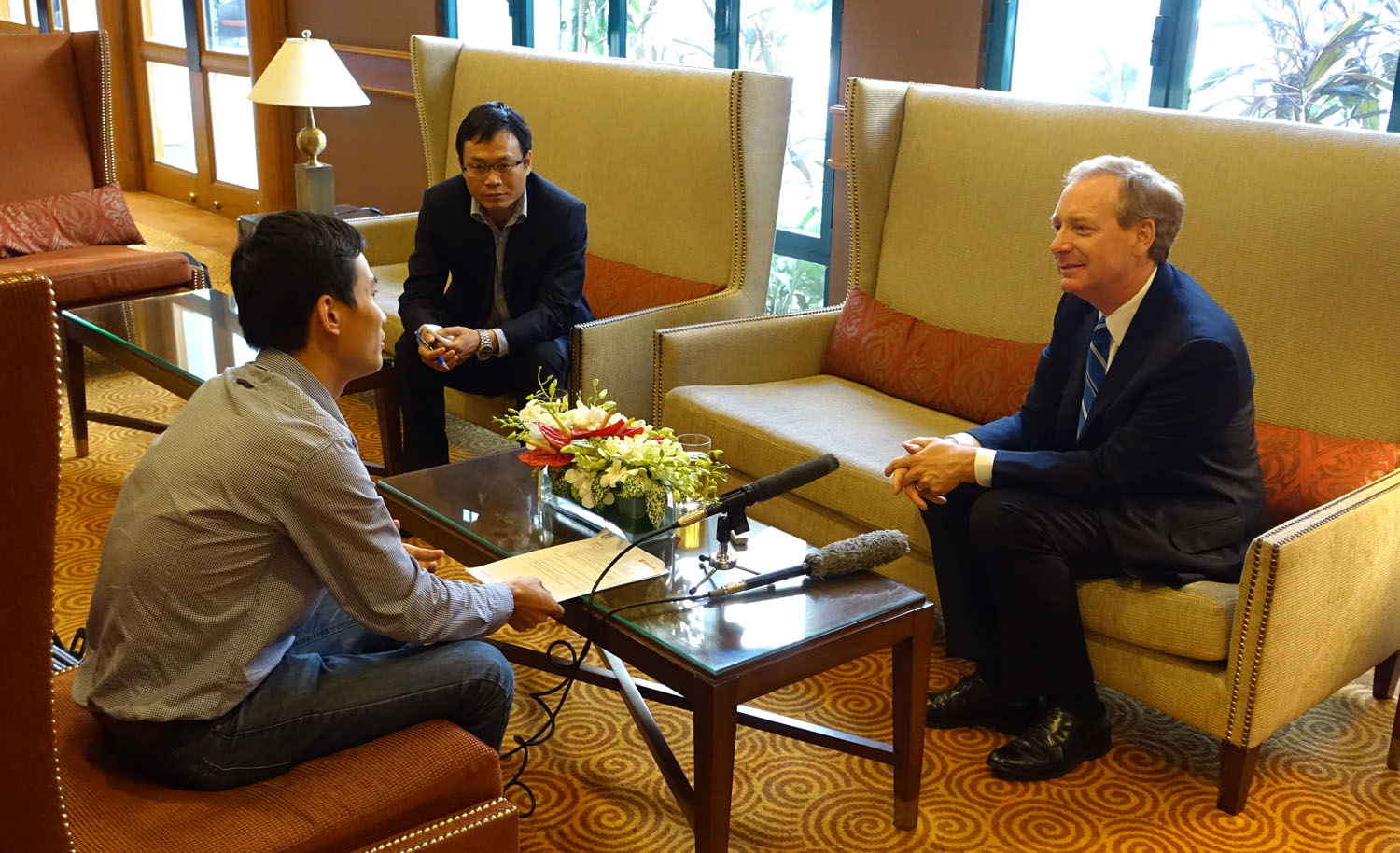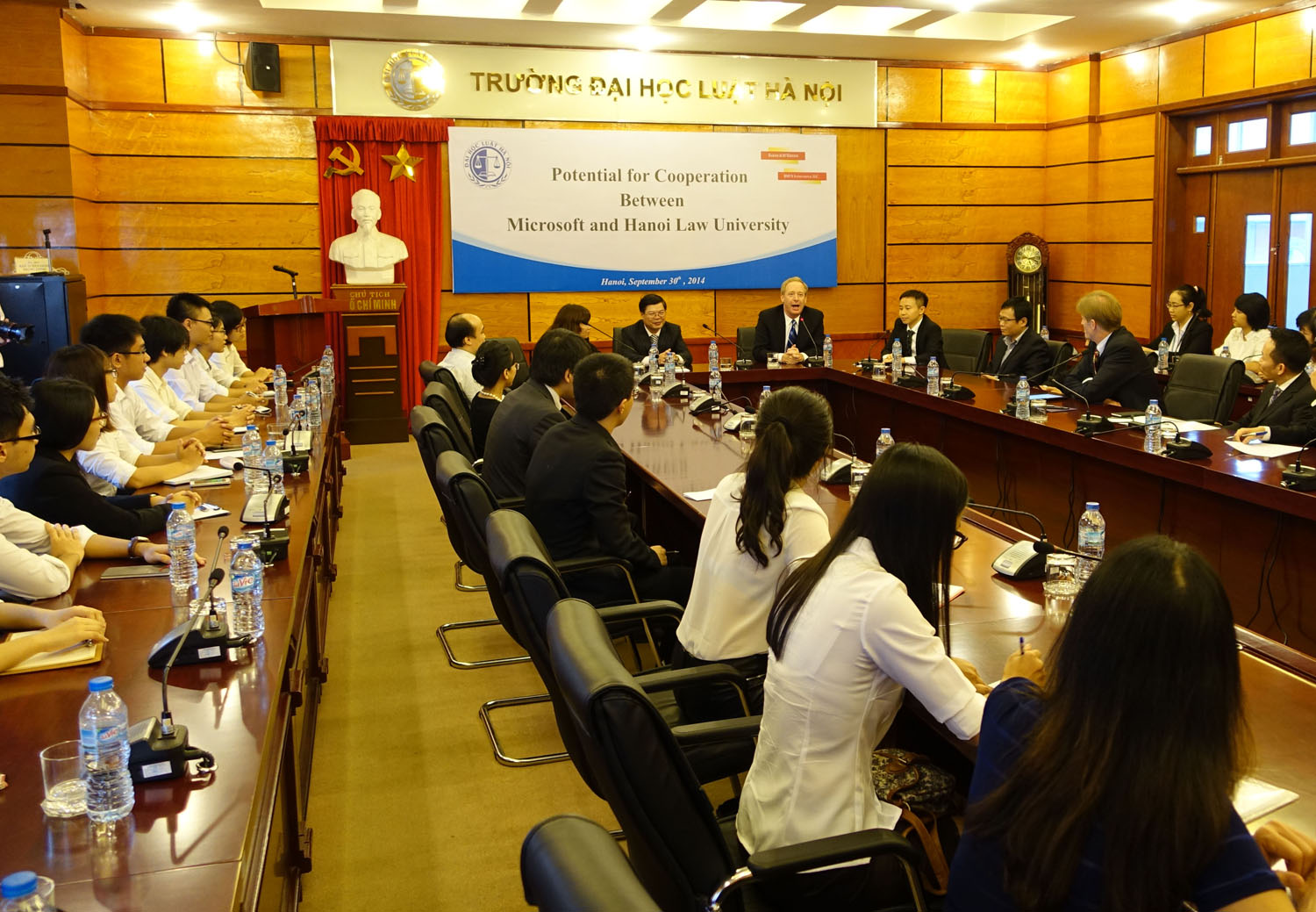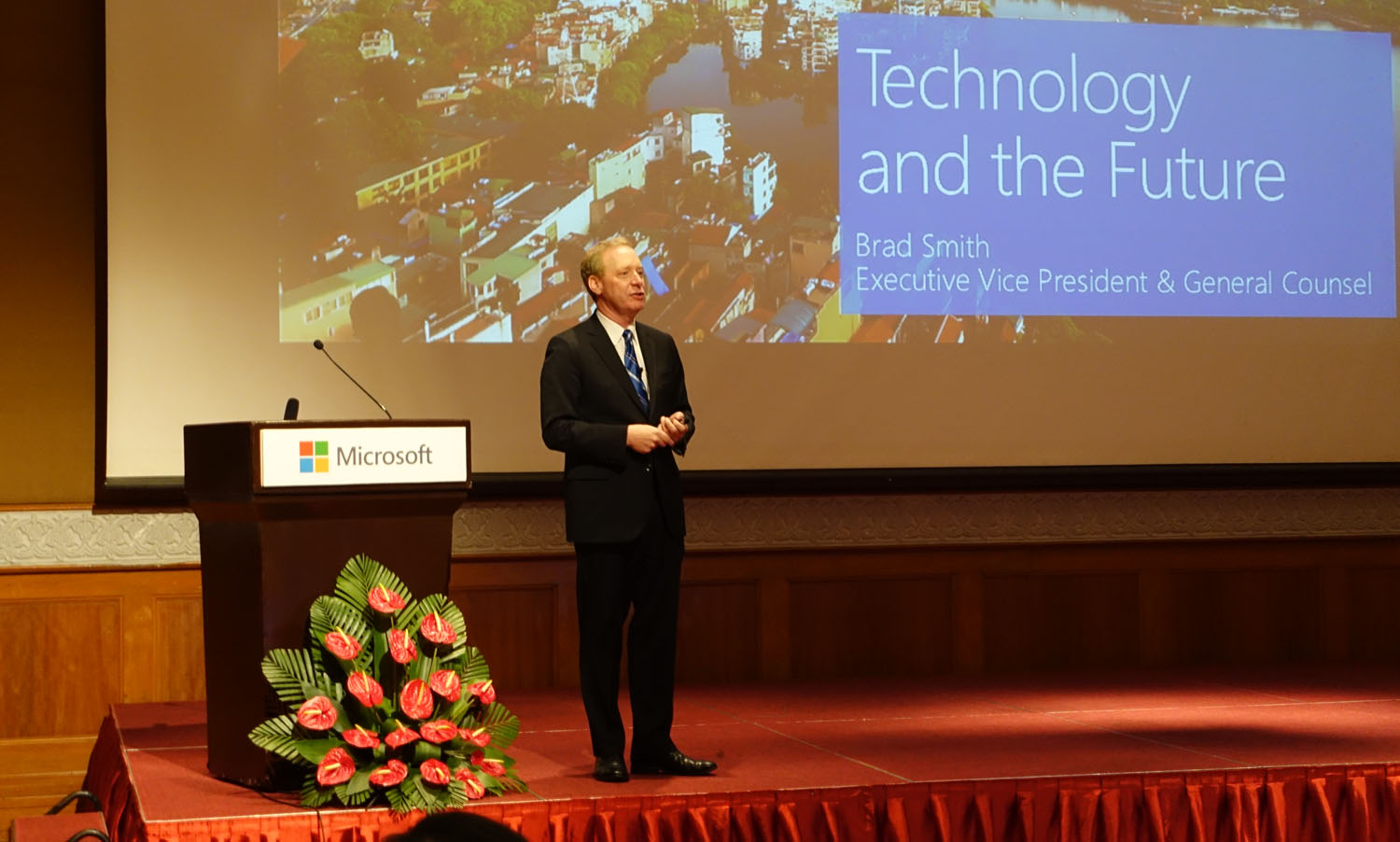HANOI, Vietnam— Microsoft’s executive VP and General Counsel, Brad Smith, recently visited Hanoi as part of this two-stop tour in Asia where he met up with government officials, visited Microsoft’s Mobile Devices factory, gave a keynote speech at an industry luncheon and had a dialogue session with faculty members of the Hanoi Law University.
Speaking to business leaders and government officials at the luncheon co-hosted by the American Chamber of Commerce (AmCham) and the Vietnam Chamber of Commerce and Industry (VCCI), Smith shared his views on the importance of trust in information technology and the company’s long-term vision for the industry in the region.
Here are five key points he touched on during his recent visit to Hanoi:
1) Transparency is key to building trust in technology
“People will use information technology only if they can trust it. And if that trust was shattered, their ability to rely on that technology, their willingness to continue to use that technology, could be shattered as well.”
Smith pointed out that one of the challenges for the IT industry today is getting people to trust technology. And with Edward Snowden’s disclosures sparking debates over national security and information privacy, people have become wary of information technology.
It has become clear that people will trust technology if there is greater transparency about how governments and companies access and obtain personal information from people, and what they do with it. This has prompted Microsoft, together with other industry leaders, to advocate for greater transparency. Smith explains that this is also why Microsoft, as a company, decided to sue the U.S. government not once, but three times. This includes the right to share information with the public about the kind of data the company has to turn over to the government and contesting the reach of U.S. search warrants beyond U.S. shores.
In emerging markets like Vietnam and Indonesia, Microsoft believes that trust is all the more crucial since it will establish the foundation for the implementation of technology in the future.

2) Security and privacy are priorities for a trustworthy cloud
“83 percent of people believe that personal information stored in the cloud deserves the same privacy protections as personal information stored on paper.”
This finding, from an opinion survey conducted in the U.S., underlines Microsoft’s belief that while the world has changed, the fundamental focus on privacy and security remains. People want the same level of legal protection under privacy and security laws when storing information in the cloud.
Smith talks about how the government of one country reaching into a data center located in another country, can in effect be interpreted as crossing a national border, and how that raises questions about sovereignty and data sovereignty in the 21st century. He believes that this is not an issue that can be resolved easily and will need countries to engage in real dialogues and formulate new international rules to move forward.
FACT: Microsoft has more than 40 employees working full-time on privacy and several hundred others worldwide focusing on privacy as part of their jobs.

3) It’s a mobile-first, cloud-first era
“Instead of starting with people’s computers on their desk, it’s now people starting with computers that are on the go.”
Whether it’s a tablet, laptop or smartphone, it is really a mobile-first orientation for the industry today. According to Smith, the devices we use today are powerful and useful because they are connected to the cloud. The cloud, he asserts, is what provides data that makes apps more useful, and allows for users to store and access data from multiple devices.
Ultimately, Smith says that the age of computing is ubiquitous, not just in the sense that computing is everywhere but that there is ambient intelligence everywhere as well. He estimates that there are 1 billion PCs, 2 billion smartphones and 7 billion people in the world today. By 2020, Microsoft expects 50 billion devices in the Internet of Things connected to data centers and the Internet around the world. These will not just be computers and smartphones, but will include devices such as thermostats, traffic lights, parking meters, garbage cans and even fire extinguishers.
FACT: Microsoft has hundreds of thousands of servers in data centers around the world that deliver more than 200 online services to more than 1 billion customers and 20 million business in 88 global markets.
4) Technology is about empowering individuals
“At the end of the day, it’s all about what technology makes it possible for people to do that they cannot do before.”
Whether it is connecting two individuals to a program like Skype, or connecting a classroom for a larger group to interact, Smith believes that technology should fundamentally be created to serve people.
He concedes that technology can also create its own set of problems such as the distribution of child pornography, which is why Microsoft has created a digital crimes unit to work with law enforcement officers around the world to combat such issues. Ultimately, the fundamental mission of the technology industry is about empowering people to do things.
FACT: Before he joined Microsoft, Smith was an associate then partner at the Washington, D.C.-based firm of Covington and Burling, where he is still remembered as the first attorney in the long history of the firm to insist (in 1986) on having a personal computer on his desk as a condition for accepting a job offer.

5) Vietnam is an important market for Microsoft
“Innovation, more than anything else, does indeed create the need for more talent.”
Visiting Vietnam for the first time, Smith is amazed by the dynamic nature of the ICT marketplace in Vietnam and the degree in which the people embrace smartphones and increasingly the Internet.
And with Microsoft in the midst of a major transformation in the country, the company is hoping to attract more people to work in the company. In fact, Microsoft is already the largest American employer of people in Vietnam as it plans to expand its workforce in its newly opened factory from the current 10,000 employees to 15,000 employees in a year’s time, according to Smith.
As part of nurturing talent in Vietnam, Microsoft is also actively working with teachers and students over the past few years. 65,000 teachers were given access to technology and technology training while more than a million students were provided with new technology tools and computing access. During a meeting with faculty members of the Hanoi Law University, Smith also revealed that there are discussions about offering scholarship programs for university students in Vietnam in the coming year.
Smith believes Microsoft is well-positioned to build a bridge across the Pacific to bring people closer together, create new opportunities and contribute to a brighter future for a new generation of people in Vietnam.





